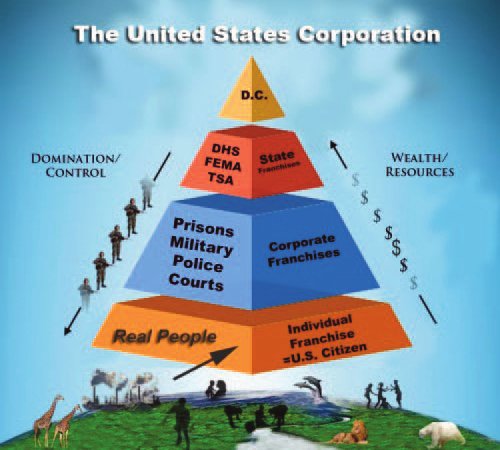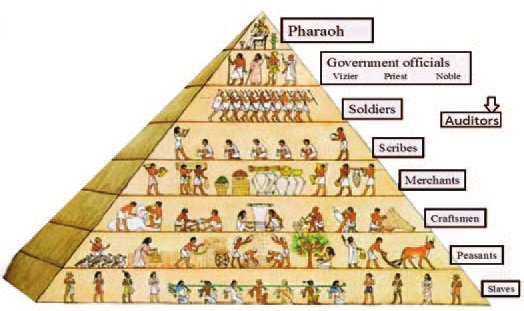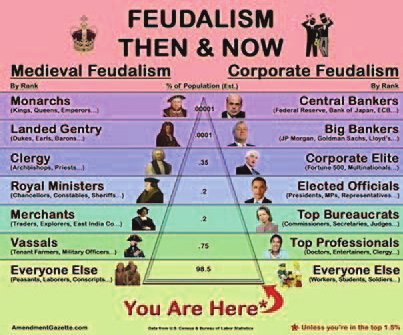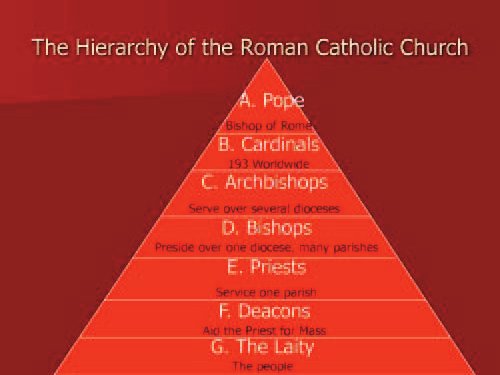
Government in the Ecclesia
The Foundation for Tomorrow’s World
The world of today is in confusion more than ever before. So many people simply do not know what is right, and black has become white and white has become black in the minds and hearts of a society that teaches we can be our own gods … deciding for ourselves what is right and wrong, like Adam and Eve in the Garden of Eden. We know very well who the author of this confusion is: Satan the devil, who has deceived the whole world and is its god (II Corinthians 4:4, Ephesians 2:2; Revelation 12:9).
A major part of the world’s confusion has to do with government and structure within organizations of men. This structure is the hierarchy of man: people ruling over other people. It is the corporate organization within governments, the military, business, religion, education, and virtually every phase of interpersonal relationships.  The author of this structure is Satan the devil, who loves to be placed at the top of a pyramid of power, with various layers of authority in descending power until one reaches the common people at the bottom, who support the people above. This hierarchical system is used by dictatorial leaders to control the people beneath them, to force obedience.
The author of this structure is Satan the devil, who loves to be placed at the top of a pyramid of power, with various layers of authority in descending power until one reaches the common people at the bottom, who support the people above. This hierarchical system is used by dictatorial leaders to control the people beneath them, to force obedience.
This structure is outlined in Luke 22:25: “The kings of the Gentiles exercise lordship over them, and those who exercise authority over them are called benefactors [euergetes (2110), “well-doers”]”. Though suffocating the citizens of a country with oppressive authority, a dictator exercising “lordship” still considers himself to be benevolent, forcing subjects to obey what he considers to be best for them. So is the manner of rulership in a sin-drenched world, where personal responsibility is suppressed, and obeisance to a dictatorial leader is demanded.
Harry Brown in his paper “The Breakdown of Government” states the case well.
“The element of force is … there as well in every government activity — from food stamps to family-leave laws — although the coercion in many programs often goes unnoticed. Suppose, for example, that you’re a barber. One day the State Board of Tonsorial Oversight issues a regulation to stop ‘cutthroat competition’ — decreeing that no barber shall charge less than $8 for a haircut. If your price is $8 or more, you won’t even notice the regulation.
“But suppose you charge less than $8. Perhaps business is slow and you need to increase sales. Maybe you’re in a low-income neighborhood where people can’t afford $8 haircuts, or perhaps your’ve just opened a new shop and need to attract customers. Whatever the reason, suppose you offer haircuts for $6.
“You may be able to do this for a week or two — or even a month or two. But eventually you’ll receive a letter from the regulators, telling you to cease and desist the forbidden practice of charging your customers no more than they’re willing to pay. If you comply by raising your price to $8, you’ll hear no more about the matter. If you don’t obey, eventually some men in suits will show up at your barber shop to warn you to stop undercharging.


If you go on ignoring the law, one day you’ll receive a subpoena — summoning you to court. If you don’t show up, or if you ignore the court’s order to raise your prices, the court will revoke your barber’s license.

 “If you defy the law by continuing to cut hair, another group of men will show up at your shop. These fellows may not be in suits, and they probably will be carrying guns. They will order you to close your shop. If you refuse, their job will be to remove you by force and take you to jail. If you resist, they will try to take you alive — but if they deem it necessary, they will shoot you.
“If you defy the law by continuing to cut hair, another group of men will show up at your shop. These fellows may not be in suits, and they probably will be carrying guns. They will order you to close your shop. If you refuse, their job will be to remove you by force and take you to jail. If you resist, they will try to take you alive — but if they deem it necessary, they will shoot you.
 “If that happens, it will be obvious that the penalty for choosing for yourself how much to charge for a haircut — and sticking to your choice — is death. Of course, you wouldn’t have had to die. You could have obeyed the law to start with, or you could have given in anywhere along this chain of events. But steadfastly opposing even the most innocuous law can lead to death. The gun is always there; its power to compel obedience is the reason — and the only reason — to involve the government.
“If that happens, it will be obvious that the penalty for choosing for yourself how much to charge for a haircut — and sticking to your choice — is death. Of course, you wouldn’t have had to die. You could have obeyed the law to start with, or you could have given in anywhere along this chain of events. But steadfastly opposing even the most innocuous law can lead to death. The gun is always there; its power to compel obedience is the reason — and the only reason — to involve the government.
“The IRS likes to say that our tax system is based on voluntary compliance. And that’s true — so long as you comply, the system is voluntary. But the moment you choose not to comply, you will be transferred to a different system.
“People seek the help of trade associations, charity organizations, and service clubs in order to urge others to support some cause. People seek the help of government in order to force compliance” (Understanding God’s Government, P. Syltie, Virtualbookworm, 2002).
The Most Important Element
It is impossible to love someone who is your overlord. This fact motivated Jesus Christ to state,
“A new commandment I give to you, that you love one another; as I have loved you, that you also love one another. By this all will know that you are My disciples, if you have love for one another” (John 13:34-35).
What does “new commandment” mean here? Do not all of the commandments inherently manifest love when they are practiced? Of course! Love here is God-plane agape (26), or “affection or benevolence, as the attitude of God toward His Son, to the human race, and to the elect; His essential nature expressed towards one another and to other men.” This attitude of selflessness and sacrifice, which has always been Elohim’s nature and is not new, is called new [kaines (2537), “not new in time (as recent), but new as to form or quality: of a different nature from what is contrasted as old”] because of the revelation that Jesus was giving of how to express that love. Growing up in a self-centered, get-for-oneself culture, the disciples knew little of what Jesus was getting at. He lived love, and kept the whole law in its intent, and fulfilled it (Matthew 5:17), in the same way that we are to fulfill it as we live our personal lives through God’s spirit and laws dwelling in us (Hebrews 8:10).
Against a backdrop of selfish quests for power by governmental and corporate leaders, Jesus Christ came to reveal truly selfless living in service to others, a way of life so foreign to His disciples within the dog-eat-dog society of His (and our) day. This was the “new” commandment, to love God with all your heart, soul, and mind, and to love your neighbor as yourself (Matthew 22:36-40), the reality that the world’s system under Satan’s sway has rejected in favor of fear, force, and get for self, the doctrines inherent within the hierarchies of today’s leaders.
What Defines Government of the Ecclesia?
People within today’s society recognize us because of this agape we have for one another in the body … and our consideration for others as well. Within the ecclesia we have gifts that define our relationship even further. These gifts are special talents, as it were, bequeathed by the holy spirit [gift (5486) = charisma, “a favor which one receives without any merit of his own”] after we have received the holy spirit at baptism and the laying on of hands. These include gifts of apostleship, prophesying, teaching, working miracles, healing, assisting, administrating, speaking in and interpreting tongues, and others (I Corinthians 12:7-10, 28). Paul adds in Romans 12:6-8 the gifts of ministry (serving), exhortation, giving, leading, and mercy. These gifts are given by the Father, and given as He pleases, not as we think we ought to receive any particular gift; the choice is not ours.
“But one and the same spirit works all these things, distributing to each individually as He wills … But now God has set the members, each one of them, in the body just as He pleased” (I Corinthians 12:11, 18).
Paul makes plain that all gifts originate from the same spirit, and work together to make the entire body work together as an organic, unified whole. One member cannot claim to another member that it has no need of him or her, but “… much rather those members of the body which seem to be weaker are necessary” (I Corinthians 12:22).
Paul cleverly likens these gifts to eyes, ears, hands, feet, and “unpresentable parts” (generative organs), emphasizing that each part is required to make the body whole. When one part suffers, all of the parts suffer; when one part is honored, all parts are honored, so that there should be no schism amongst the elect. Each member should have the same care for the others. No one is better or worse, higher or lower, greater or lesser than another; only the responsibility God has given them within the body differs!
By this means we serve one another in the pattern that the Father, in His infinite wisdom, has determined. As a body, we are also likened to a house (Hebrews 3:6; I Peter 2:5) and to the composition of the heavenly Jerusalem (Revelation 21:2-3). These structures are bound together in unity, like the human body is knit together in oneness.
It is especially noteworthy that our heavenly Father requires us to use these gifts He has given us. See what both Peter and Paul have to say on this matter.
“Having then gifts differing according to the grace that is given to us, let us use them: if prophecy, let us prophesy in proportion to our faith …” (Romans 12:6).
“As each one has received a gift, minister it to one another as good stewards of the manifold grace of God” (I Peter 4:10).
 The question is not whether or not a member of the body should use the gift(s) he or she has been given. These gifts must be used!
The question is not whether or not a member of the body should use the gift(s) he or she has been given. These gifts must be used!
The Greatest of These Is Love
 We have already discussed love (agape), that terribly maligned term in today’s world. While spiritual gifts are critical to exercise, and we should desire the greatest gifts, Paul made clear that the way of love is “a more excellent way” (I Corinthians 12:31). Thus, the “new commandment” Jesus Christ spoke of, to love one another, transcends everything we do! It forms the pillar of government within the ecclesia, and without it all is lost. We and our exploits will come to nothing without it.
We have already discussed love (agape), that terribly maligned term in today’s world. While spiritual gifts are critical to exercise, and we should desire the greatest gifts, Paul made clear that the way of love is “a more excellent way” (I Corinthians 12:31). Thus, the “new commandment” Jesus Christ spoke of, to love one another, transcends everything we do! It forms the pillar of government within the ecclesia, and without it all is lost. We and our exploits will come to nothing without it.
“Though I speak with the tongues of men and of angels, but have not love, I have become sounding brass or a clanging cymbal. And though I have the gift of prophecy, and understand all mysteries and all knowledge, and though I have all faith, so that I could remove mountains, but have not love, I am nothing. And though I bestow all my goods to feed the poor, and though I give my body to be burned, but have not love, it profits me nothing. Love suffers long and is kind; love does not envy, love does not parade itself, is not puffed up, does not behave rudely, does not seek its own, is not provoked, thinks no evil, does not rejoice in iniquity, but rejoices in the truth; bears all things, believes all things, hopes all things, endures all things. Love never fails. But whether there are prophecies, they will fail; whether there are tongues, they will cease; whether there is knowledge, it will vanish away.”
 Inherent within this greatest of all attributes is being in subjection to one another (Ephesians 5:21; I Peter 5:5), and doing to others as you would wish to have done to yourself (Matthew 7:12; Luke 6:31). It is the attitude of thinking of others as being better than oneself.
Inherent within this greatest of all attributes is being in subjection to one another (Ephesians 5:21; I Peter 5:5), and doing to others as you would wish to have done to yourself (Matthew 7:12; Luke 6:31). It is the attitude of thinking of others as being better than oneself.
“Let nothing be done through selfish ambition or conceit, but in lowliness of mind let each esteem others better than himself. Let each of you look out not only for his own interests, but also for the interests of others. Let this mind be in you which was also in Christ Jesus …” (Philippians 2:3-5)
This is an astounding statement, that Jesus does not place Himself above any of us, His brethren! Can we grasp the reality of this statement of true, unfeigned humility, that the Creator of all that is does not elevate Himself above us sinners, for whom He died to make clean? This is the attitude of love that we must have among all of us in the ecclesia … the love that is meant by loving God with all of our might and our neighbors as ourselves!
Consider the comments by John R. Kohlenberger, III, on agape love in Strong’s Expanded Exhaustive Concordance of the Bible (Thomas Nelson, Nashville, Tennessee, 2001):
“Christian love has God for its primary object, and expresses itself first of all in implicit obedience to His commandments (John 14:15, 21, 23; 15:10; I John 2:5; 5:3; II John 6). Self-will, that is, self-pleasing, is the negation of love to God. Christian love, whether exercised toward the brethren or toward men generally, is not an impulse from the feelings, it does not always run with the natural inclinations, nor does it spend itself only upon those for whom some affinity is discovered. Love seeks the welfare of all (Romans 15:2), and works no ill to any (Romans 13:8-10), seeks opportunity to do good to all men, and especially toward them that are of the household of faith (Galatians 6:10) …. [Regarding God] it expresses the deep and constant love and interest of a perfect Being towards entirely unworthy objects ….”
Demolishing the Hierarchy
One of the most appropriate and powerful teachings on government for the ecclesia leaps from the pages of Philemon. Paul wrote from prison to Philemon, a brother in Christ who hosted fellowship in his house in Colossae. His slave Onesimus had for some reason fled his master’s house and found Paul in prison, and was convicted of the truth through Paul’s teaching, such that Paul said,
“For perhaps he [Onesimus] departed for a while for this purpose, that you might receive him forever, no longer as a slave but more than a slave — a beloved brother, especially to me but how much more to you, both in the flesh and in the Lord” (Philemon 15-16).
This short book clearly illustrates the oneness of the body of Christ, that whether a person’s background is that of a slave or a king, in God’s eyes and within the ecclesia there is no partiality, no favoritism, no respecting of persons (Acts 10:34-35; Romans 2:11; Ephesians 6:9; I Peter 1:17). Though by Roman law Onesisus could have been killed for deserting his master, by God’s law the slave is now on equal footing with his former master, though he may still perform the duties of a slave. In the eyes of the Creator there is no hierarchy among men, no rule of one person over another, no “fear and force” exercised by humanly-devised governmental structures to stifle the expression of spiritual gifts.
After Paul had reviewed the exploits of the patriarchs in Hebrews 11 — Abel, Enoch, Noah, Abraham, Isaac, Jacob, Joseph, Moses, and others — he interjected a most revealing statement, claiming that “… all these, having obtained a good testimony through faith, did not receive the promise [of eternal life], God having provided something better for us, that they should not be made perfect apart from us” (Hebrews 11:39-40).
What an astounding statement! This verse shows that the patriarchs are in no way to be placed “above” modern-day saints, or those who have lived during the centuries from then until now. All are amongst the ecclesia, like Christ looking upon others as better than themselves, a part of the body, none saying he is better or worse than anyone else, and expressing agape love for one another as they await the resurrection. Of course, the patriarchs are dead, but when they arise at the seventh trumpet they will be joined by others who have been called and chosen by the Father, and given His spirit.
Some may claim that Ezekiel 37:24 states that David will be king over “them” [Israel] during the millennium, and “… they will all have one shepherd”, thus proving that some of the resurrected saints will be greater than others and confirming a hierarchy within the ranks of the raised elect. However, this scripture is referring to the return of Israel to the land of Palestine once the yoke of slavery is removed, and at that time God will give them a King of His own choosing. This King would in some ways be like David of old, but the reference is really to the long-awaited Messiah! The Israelites sometimes referred to the Messiah as “David” because it was known that the Messiah would come from David’s lineage (Matthew 4:5; Luke 1:17; Mark 9:11-13).
Thus, the fact that we will be kings and priests and will reign on the earth (Revelation 5:10) places us all on equal footing with the patriarchs — brothers of Jesus Christ — and David, Elijah, Moses, Abraham, and others will be working side-by-side with us to restore the earth to Edenic splendor! The raised elect wil be given rulership over the nations (Revelation 2:26-27; 20:4) and will judge the world (I Corinthians 6:2). The elect are, and will be, a royal priesthood and a holy nation (I Peter 2:8; Revelation 3:21). In the Kingdom they will sit on the Father’s throne alongside Jesus Christ (Revelation 3:21). Responsibilities will surely vary to some degree, as alluded to in the Parable of the Minas (Luke 19:11-27) and the “mansions” (Greek monay) and place prepared (John 14:1-2), but even then there will be no rivalries or jealousies among a people made perfect in the spirit, washed clean and unable to sin (I John 3:9).
Called to Liberty
Failing to practice agape love and embrace the gifts of the spirit is a brutal blow to anyone attempting to please our heavenly Father. It is an abrogation of keeping the “new” commandment, and a failure to extricate oneself from the opposite of agape love … the fear of men (Psalm 146:3-4). Timothy illustrated this contrast in II Timothy 1:7 when he stated “For God has not given us a spirit of far, but of power and of love and of a sound mind” … the kind of fearlessness that Yahweh declared to Joshua when they were about to claim the Promised Land:
“No man shall be able to stand before you all the days of your life …. Only be strong and very courageous, that you may observe to do according to all the law which Moses My servant commanded you: do not turn from it to the right hand or to the left, that you may prosper wherever you go …. Have I not commanded you, ‘Be strong and of good courage; be not afraid, nor be dismayed, for the Lord your God is with you wherever you go’” (Joshua 1:5, 7, 9).
Even as love and fearlessness before men are traits of those possessing God’s spirit, so is liberty a major consequence of this way of life. The ways of Satan’s society — lusts of the flesh and selfish gain — are paraded as the best course by so many in today’s world, but “While they promise them liberty, they themselves are slaves of corruption …” (II Peter 3:19). What better statement is there to illustrate the consequences of love to God and neighbor versus capturing the spirit to sin, “…for by  whom a person is overcome, by him also he is brought into bondage” (II Peter 3:19). This bondage is the power sought by leaders in human governments to rule over other people.
whom a person is overcome, by him also he is brought into bondage” (II Peter 3:19). This bondage is the power sought by leaders in human governments to rule over other people.
The Greek word used for liberty in the New Testament is eleutheria (1657), meaning “liberty or freedom”. Liberty is defined as “freedom or release from slavery, imprisonment, captivity, or any other form of arbitrary control [by other people].” It is the release of all of the creation, including mankind, that will be experienced at the return of Jesus Christ and the saints to establish the Kingdom on earth (Romans 8:21), a liberty that is termed “glorious”! Liberty is called a “perfect law” by James (James 1:25; 2:12), an inherent quality we have with God’s spirit (II Corinthians 3:17), and a way of life to the elect (Galatians 5:13). It is in liberty that we are to “stand fast” (Galatians 5:1), not slipping again into bondage to men from which we were called out of this world. It is this subjection to fear and control by other men that we have left behind, and consequently we have become “new creatures”; all things have become new for us (II Corinthians 5:17).
In ancient Israel liberty [deror (1865), “freedom, liberty”] was to be declared every 50 years, on the Day of Atonement — a Jubilee — at which time massive adjustments were made throughout the nation. These changes included the following (see Leviticus 25:8-17).
l A return of everyone to his family’s permanent allotment of land. His physical inheritance was returned to him free of charge so he could start life anew, should he have lost it for some reason during the previous 50 years.
l Freedom from all debts. This relief from debt had occurred during each of the seven sabbatical years leading up to the Jubilee, reversing the course of debt where the borrower is the servant of the lender (Proverbs 22:7); he is in bondage, with liberty compromised.
l No planting and reaping of crops, but the land was to rest. Such was also true for the sabbatical years. There was liberty from the hard, sweaty labor of planting, weeding, and harvesting crops, but instead what grew on its own accord could be consumed on a day-by-day as-needed basis.
A key to the keeping of the Jubilee year and land sabbaths was to remove oppression of one person over another (Leviticus 25:14, 17). Oppress in Hebrew is yanah (3238), or “to rage or be violent, to oppress or maltreat”, the very opposite of liberty. This release from oppression is the core meaning of Jesus’ words in Luke 4:18 (see also Isaiah 61:1).
“The spirit of the Lord is upon Me, because He has anointed Me to preach the gospel to the poor; He has sent Me to heal the brokenhearted, to proclaim liberty to the captives, and recovery of sight to the blind, to set at liberty those who are oppressed .
Where God’s spirit is, there is liberty … removal of subjugation of man over man, release from the hell of captivity to ignorance or literal incarceration, illumination to the truth, literal healing of blindness, and removal of mental oppression by Satan or by other men acting as the devil’s emissaries.
Live in the Truth!
Jesus Christ made it plain that the hierarchies which use fear and force to rule are not to be a part of the ecclesia. Rather “… he who is greatest among you, let him be as the younger, and he who governs as he who serves” (Luke 22:26). Jesus went on to state that He came among men as One that serves, through He was the greatest among men … turning the world’s logic on its head!
The result of failing to recognize and follow this Godly approach to government in the ecclesia is the bringing into the very body of Christ the Satanic hierarchy which our Father in heaven abhors! That is why He castigated the church in Smyrna for tolerating those who held the doctrine of the Nicolaitans (Revelation 2:15). This group “ruled” in the ecclesia, “lording it over” others, for the word itself means “victorious over the people” Their mode of government is no different than the hierarchies of men already described: people ruling over people, not brethren submitting to one another (Ephesians 5:21) and serving one another with their spiritual gifts (I Peter 4:10). Diotrophes was one of these authoritarian leaders, whom Paul railed against, who “… does not receive the brethren, and forbids those who wish to, putting them out of the church” (III John 10).

It is my belief that associations of brethren who incorporate with a state or federal governmental agency will face strict judgment from God, and eventually find their organization destroyed by the One who purchased each member out of this world through the blood of Jesus, His Son. This happened with the Worldwide Church of God, and it will occur with the other groups as well. God hates the organizational structure of the corporation, for it is inherently hierarchical (top-down), the pattern Satan the devil uses to control and enslave mankind throughout the world.
We have an incredible future to look forward to in which the government within the ecclesia — based on agape love — will be expanded to encompass people in nations throughout the earth. Gone will be police, military forces, and volumes of laws meant to curtail evil so the saints will be protected. That is, after all, their official function (Romans 13:4-6). If evil is quenched, then so is the need to police the people; a moral, law-abiding people is not in need of protection any more, for the Eternal will be their Guardian.
We must practice the government of God currently today in our midst, and, and disband with the rulership of men over other men. Our relationship to one another is centered upon love, kindness, faithfulness, joy, gentleness, humility, peace, patience, and service (Galatians 5:22-23). Let us identify the world’s selfish facade and reject it, and put on the whole character of our Creator who loves us beyond our wildest dreams!

